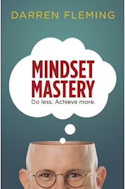Brian de Haaff* says while our immediate response to work interruptions tends to be negative, they could be a valuable opportunity to help others.
 Interruptions are distracting, and especially harmful if you are doing meaningful work. Right?
Interruptions are distracting, and especially harmful if you are doing meaningful work. Right?
Well, this is what we are told.
Perhaps you have seen the study that says after just 20 minutes of interrupted performance, people reported significantly higher frustration and stress than those left alone.
When you are focused on accomplishing a task or doing complex work and you are interrupted you feel startled and want to flick the irritation away.
Yes, we are taught to avoid interruptions, but I think that embracing them instead allows us to create the most value for ourselves and others.
This is a fundamental concept that powers Aha! — the idea that interruption drives value creation.
It is the basis of The Responsive Method (TRM).
TRM is our framework for personal and business success. It helps us (and many others) get the most out of today’s non-stop free-flow of information.
We know that when someone reaches out to ask for help that we have the best chance of solving a problem when the need is fresh.
We also know that we benefit when we are in the service of others.
No one waits well. I definitely do not.
The more time that passes before we stop and help the person who needs us, there is a good chance that they will be frustrated and may no longer even need us.
So we see interruptions as opportunities. They are opportunities because we receive value from supporting others.
Besides, even if you wanted to, you could not avoid interruptions.
Pings happen all day long at work — every six to 12 minutes according to some studies.
If you assume that most folks are working at least nine hours a day that is 90 would-be distractions.
Some might be urgent issues that need to be addressed immediately and others are longer-range requests or just workplace banter.
The challenge is that with so many interruptions it might seem hard to stay focused and get much done.
So how can you always welcome interruptions, avoid distractions, and accomplish meaningful work?
That is the question I get most when I share that being responsive to interruptions is the core of TRM.
My answer is that you just need a plan for how to embrace the interrupts and still perform at a high level:
Make your responsiveness known
Remember that most people do not want to interrupt you.
As I wrote earlier, we have been taught that interruptions are distractions and therefore rude.
However, you do not want to leave it up to others to determine what is “worth bothering you” over.
Similarly, you do not want them to avoid asking because they are worried you will be too slow to respond.
Make it clear to colleagues and clients that you not only welcome interruptions, you make it a priority to be responsive.
Take a moment and give thanks
Give yourself a moment to transition when you are interrupted.
Find a good stopping point with whatever you are doing (assuming it is not an emergency).
This helps you avoid responding quickly or harshly.
We all know that giving thanks leads to less stress and more happiness.
Even just mentally thanking someone for looking for help from you can reset your mood.
This will help transform your perception of an interruption from distraction to opportunity.
Be intentional with your response
An interruption means someone needs help and thinks you can provide what they need.
Your expression and reply matters, so give a genuine and transparent answer.
Even if it is to say that you need time to digest the request or you would appreciate if the person followed up with more information to help you better understand the situation.
This is especially if the decision (based on your goals) is no — explain why.
Request a follow-up interruption
Maybe your feedback helped solve exactly what was needed.
Or maybe the confusion continued with additional questions that need answering.
How will you know unless you ask? As part of your reply, ask folks to follow up with you if they have additional questions.
Or if you suggested a specific action, ask them to follow up and tell you how it worked out.
This is a perfect way to bring a reciprocity norm into your work.
Where you are able to serve others and benefit from learning what worked (and what didn’t) so you can do better next time.
When you combine responsiveness, gratitude, and intentional action, then you can be your best self and help others be awesome too.
So here is my challenge to you: For the next week, every time you hear the ping of a message notification, follow the steps above.
Pay attention to how you feel, how you react, and the support you provide.
*Brian de Haaff is the Chief Executive of cloud-based software company Aha! He can be contacted on Twitter @bdehaaff.
This article first appeared on the Aha! company website.











